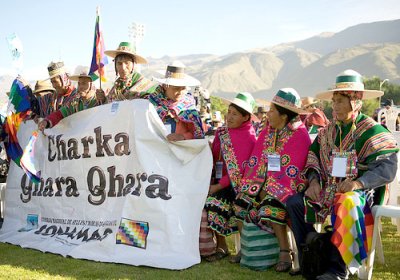Perhaps no other sector better exemplifies the challenge the Bolivian government faces in lifting the country out of the poverty and dependency afflicting South America’s poorest nation than its all-important mining industry.
Mining minister and former miners’ union leader Jose Pimentel told Green Left Weekly: “Bolivia has been a mining country for more than 500 years, ever since the Spanish came and discovered the legendary wealth [of the silver mines] of Potosi.”
Cochabamba
Under the new constitution approved in January 2009, the state now controls all minerals, metals, precious and semi-precious stones in the country.
While respecting previously granted concessions to private companies, it has restricted new concessions to joint ventures with the state
In 2007, the Bolivian government returned 100% control of the Huanuni tin mine to the state-owned Comibol.
On May 3, the government nationalised the Glencore-owned antimony smelter, which has been out of operation for more than two years.
The tremendous success of the April 19-22 World Peoples Summit on Climate Change and Mother Earth Rights held in Cochabamba, Bolivia, has confirmed the well-deserved role of its initiator — Bolivian President Evo Morales — as one of the world’s leading environmental advocates.
Since being elected the country’s first indigenous president in 2005, Morales has continuously denounced the threat posed by the climate crisis and environmental destruction.
Morales has pointed the figure at the real cause of the problem: the consumerist and profit-driven capitalist system.
“There are two ways forward: Either save capitalism, or save Mother Earth”, Bolivian President Evo Morales said, stressing that this was the choice facing governments at a May 7 press conference in New York. There, he discussed the outcomes of the 35,000-strong World People’s Summit on Climate Change and the Rights of Mother Earth with United Nations Secretary-General Ban Ki-moon.
In the Cochabamba football stadium on April 22, diverse indigenous peoples paraded around the track, thousands of local peasants sat in the stands, and thousands more activists from around the globe waved flags and chanted on the field.
A common sentiment flowed through the crowd: something historic had occurred over the previous three days during the April 19-22 World People’s Conference on Climate Change and the Rights of Mother Earth organised by the Bolivian government in Cochabamba.
The World People’s Conference on Climate Change and the Rights of Mother Earth held in April 19-22 in Cochabamba, adopted a People’s Agreement on tackling climate change. Some of its key points are listed below. Visit Pwccc.wordpress.com to read the full document, and other resolutions adopted by the summit.
The People’s Agreement includes the following points:




